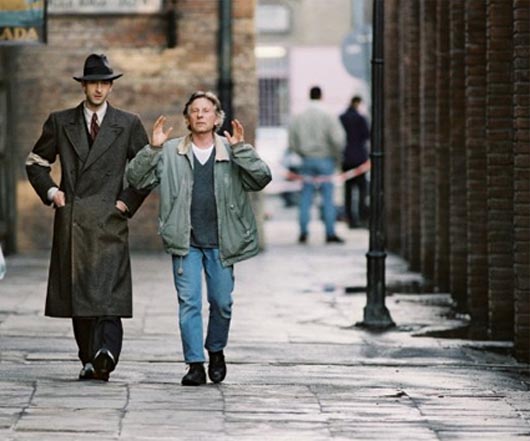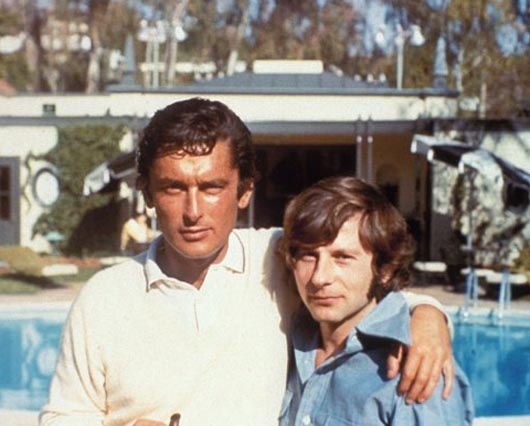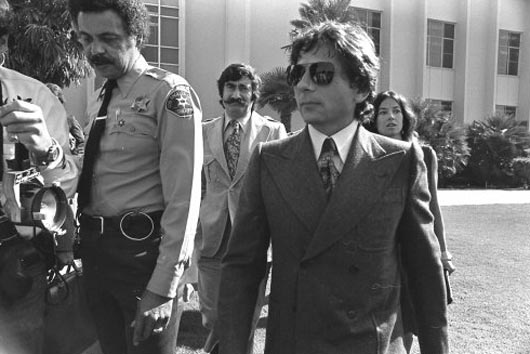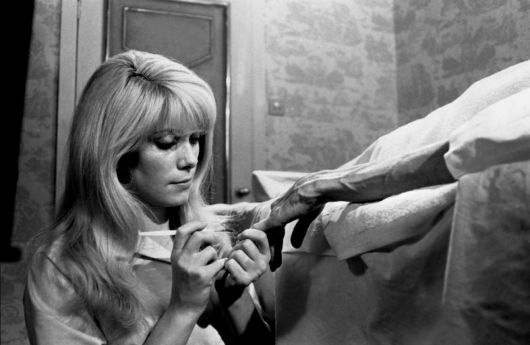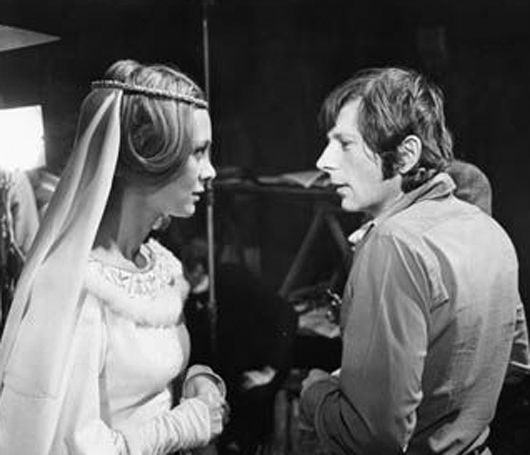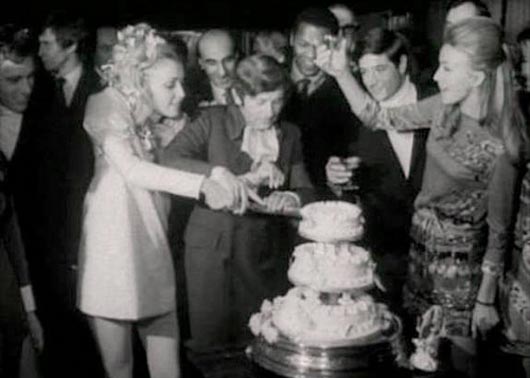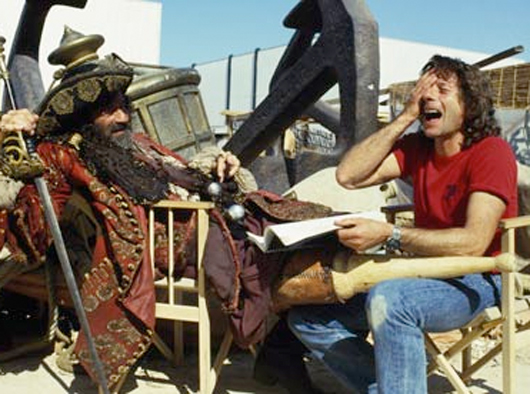 FILM
FILM In Which We Bathe In The Shadows Of The Masters
 Tuesday, September 9, 2014 at 10:28AM
Tuesday, September 9, 2014 at 10:28AM 
The Great Jean Renoir
by ALEX CARNEVALE
There is a special and essential cachet attached to unfinished books. Despite their incomplete nature, the tomes naturally have an affinity with puzzles or codes, and because of this the texts themselves are often subject to more than one reading. Also because they are not whole, other individuals feel more assertive about adding or subtracting writing from the original, under the supposition that they are putting together the work the way the author imagined. It is this way with Andre Bazin's seemingly innocent 1971 appreciation of his favorite filmmaker, Jean Renoir.

Even Truffaut's introduction to the volume he edited completely obfuscates the book itself. He writes,
No one should expect me to introduce this book with caution, detachment or equanimity. Andre Bazin and Jean Renoir have meant too much for me to be able to speak of them dispassionately. Thus it is quite natural that I should feel that Jean Renoir by Andre Bazin is the best book on the cinema, written by best critic, about the best director.

Andre Bazin, whose health deteriorated year after year, found the strength to look at films and to comment on them until his last day. The day before his death he wrote one of his best essays — the long analysis of The Crime of M. Lange — having watched the film on television from his bed.
Renoir's work excited Bazin more than any other. He was working on this study of his favorite director when he died. His fragmentary manuscript has been reconstructed and completed by his friends with the assistance of his wife, Janine Bazin.
I am responsible for the final organization of the work, for its division into ten chapters approximating the chronological development of Renoir's work. Obviously Bazin would have done it differently if he had had time. I think he intended to devote a chapter to the themes treated by Renoir, another to his work with actors, another to the adaptation of novels.
In one of his last letters, Bazin wrote me, "I am circling around Renoir by reading the life of Augustus, the novels of Zola: La Bete Humaine and Nana, Maupassant... I will eventually have to approach him more directly but I am now at a point where I know either too much or not enough. Too much to be satisfied with approximations, not yet enough to fill in all the variables of his equations."
I am not far from thinking that the work of Jean Renoir is the work of an infallible filmmaker. To be less extravagant, I will say that Renoir's work has always been guided by a philosophy of life which expresses itself with the aid of something much like a trade secret: sympathy.

Before Bazin's book even begins, Jean Renoir weighs in with a foreword of his own:
The more I travel through life, the more I am convinced that masks are proliferating. I have difficulty finding a woman whose face looks as it really is. Our age is a triumph of make-up. And not only for faces, but more important, for the mind as well.
The modern world is founded on the ever increasing production of material goods. One must keep producing or die. But this process is like the labor of Sisyphus. Forgetting Lavoisier's dictum, "In nature nothing is created, nothing is lost; everything is transformed," we convince ourselves that our earthly machines will succeed in catching up with eternity. But to maintain the level of production on which our daily bread depends, we must ever renew and expand our enterprises.
It turns out that Renoir does not know Bazin very well, other than by his little French beret. He struggles with the same problem the author of Jean Renoir has — knowing too much or too little about his subject. For the final version of Jean Renoir is as much an obliteration of its subject as a celebration.

Almost every section of Jean Renoir contains the same blandishment about the director. Each section begins, "Renoir is the greatest living French director" or "Renoir is unmatched" in such-and-such field. This kind of repetition would be the first accessory sacrificed if the author had been alive to revise his work; here they serve as eerie reminders that the admiration is rehearsed.
The second part of Jean Renoir amounts to lame defenses of The River and Paris Does Strange Things, two films that for various reasons seem to have offended Bazin's sense of the cinema in some way. He waves aside his own objections and Truffaut replaces them, in the book's third section, with Renoir's own autobiographical reminiscences of his days as a young, inexperienced directors, film treatments, and interviews.

Renoir writes, What I know is that I am beginning to understand how one should work. I know that I am French and that I must work in an absolutely national vein. I know also that in doing this, and only in doing this, can I reach people from other nations and act for international understanding.
I know that the American cinema will collapse because it is no longer American. I know too that we must not spurn the foreigners who come to us with their knowledge and talent; we must absorb them. It is a practice which has served us rather well from Leonardo da Vinci all the way to Picasso. I believe that the cinema is not so much an industry as people would have us believe and that the fat men with their money, their graphs, and green felt tables are going to fall on their faces.
Jean Renoir never made another film after Jean Renoir was published. No one would give him the money.

The best part of Jean Renoir is the book's filmography, an appendix in which Renoir's various projects are taken up by a variety of critics and directors. (Truffaut himself writes the majority of them.) These short discussions of the films innovated the concept of a "recap," for they prove that simply describing a cinematic plot reveals vast differences in character and perception. This is most evident in Truffaut's rundown of The Rules of the Game:
The nine principal characters of The Rules of the Game have a sentimental problem to resolve, and since the film shows them on the eve of a crisis, we will see them behave at their worst. The only sincere person — the pilot Andre Jurieu — awkward in an unfamiliar milieu, unleashes a tragicomedy in which he is the only victim, precisely because he has not followed the rules of the game.

Ludicrous skeletons, the characters of The Rules of the Game, viewed at a critical moment in their decay, forsake the farandole ("It's nice but it's a little old-fashioned") for a danse macabre which assaults the senses. For the ostensible purpose of a party, they are led to disguise themselves, which is to say, to take off their masks. The shadows of the masters and servants mingle and merge in an image of a sybaritic life style which cannot last: man is imperfect, he is a born liar, and besides, "If love is endowed with wings, is it not to flutter?" The Rules of the Game is a profoundly pessimistic film, a bitter and prophetic carnival in which friendship itself is exposed as just another empty game.
The word game is used over 200 times in Truffaut's two page description.

At some point in any hagiography, the idolatry itself becomes absurd. In Jean Renoir, there is no evidence of insincerity on the part of Jean Renoir's admirers. No doubt he was their very favorite, the person whose artistic work can be credited in part for giving birth to their own, whether it be new movies or essay-length film criticism. But there is also a movement just as strong away from what Renoir has accomplished; it equates to the difference between the sympathy they admire in Renoir and true empathy.
Admiration, especially the deeply ingrained kind, eventually distances the ardor from its subject. The act of writing a book in celebration of their cinematic hero feels like filing him away in history. None of their work would exist without Renoir, Bazin & Godard & Truffaut find themselves admitting, and having said this, they have finished with the man, eight years before he died in Beverly Hills. As Eric Rohmer puts it in his review of Renoir's Madame Bovary, "the roads that lead to art and truth are different, and it is the point where they cross which has always fascinated Renoir. Each perspective is true, each is false. They complement one another."
Alex Carnevale is the editor of This Recording.

"Oxygen" - Marie Fisker & Kira Skov (mp3)
"I Lost Something In The Hills" - Marie Fisker & Kira Skov (mp3)































